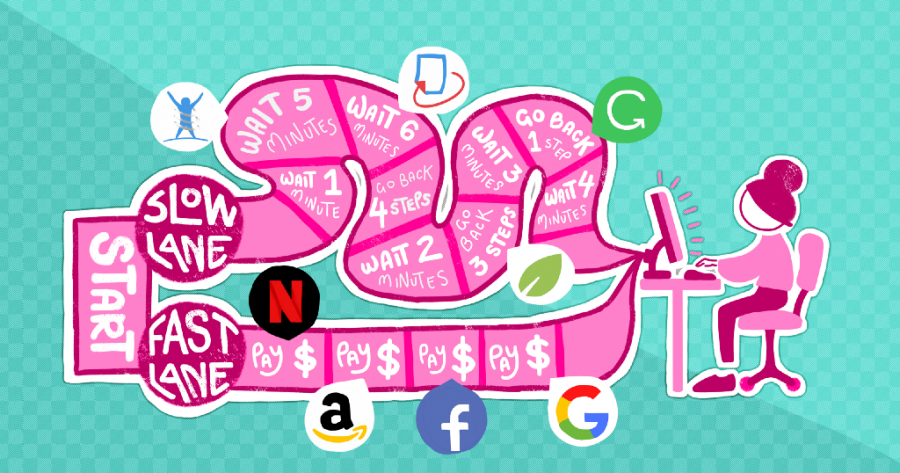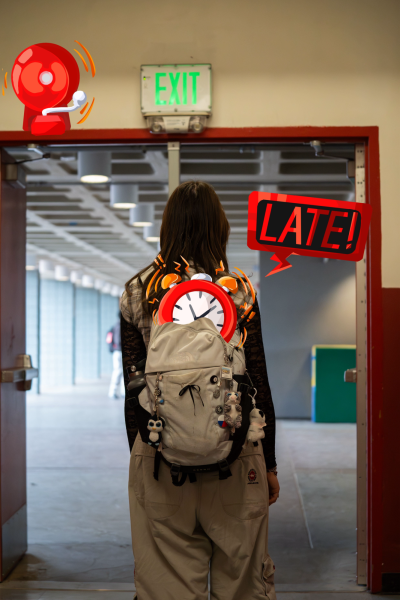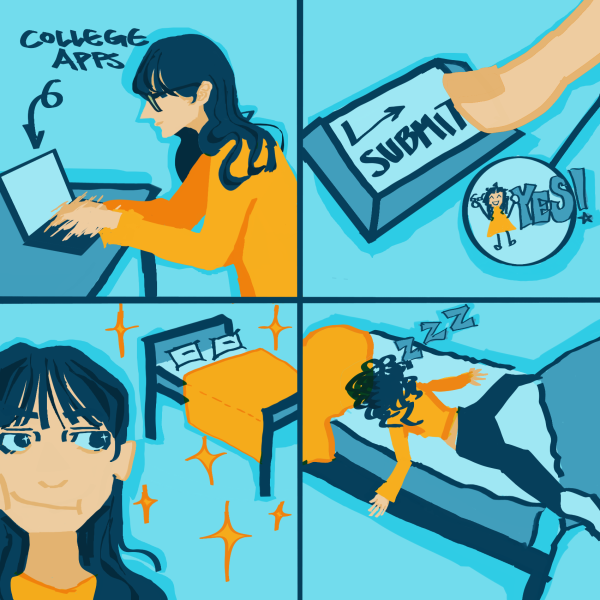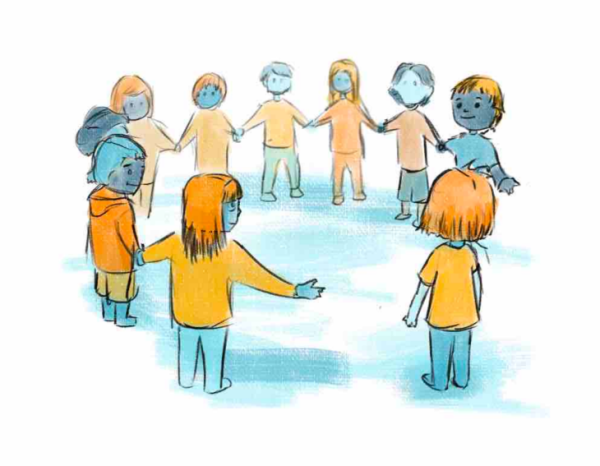Internet Ajit-ated: How the repeal of net neutrality will affect education
A comparison between the two possible consequences of net neutrality. Illustration by Valentin Nguyen
I n December 2017, Ajit Pai, chairman of the Federal Communications Commission (FCC), voted to repeal Title II, also known as the 2015 net neutrality rules. This news immediately triggered a rapid reaction of opposition throughout the nation, especially amongst younger generations that have grown up online.
Its repeal was enacted on April 23 — and no one seems to be talking about it.
Technology has become so integrated into our lives that the panic surrounding the repeal of net neutrality is natural. But do we truly understand what net neutrality is and what its repeal means? Although the buzz about net neutrality has somewhat died down, the topic remains relevant. Its repeal was enacted on April 23 — and no one seems to be talking about it.
One of the main hurdles on tackling the subject of net neutrality is the confusion surrounding what its repeal will mean for the consumer. One common misconception about the repeal of net neutrality is that the consumer will have to pay for each individual online search, and that therefore its repeal will make the free knowledge we associate with the internet only available to those who can afford it. In reality, it’s a lot more complicated, and most of the burden of cost falls onto web companies.
Without net neutrality, Internet Service Providers (ISPs) can create fast and slow lanes on the internet, which dictate the speed at which information will reach internet users the fastest.
Without net neutrality, Internet Service Providers (ISPs) can create fast and slow lanes on the internet, which dictate the speed at which information will reach internet users the fastest. With these fast lanes and slow lanes, wealthier web companies can pay ISPs for faster service. In a school setting, for example, if a student or teacher looks up an answer to a question online, certain answers on websites will reach them faster than others.
This would also mean that some sites that students and teachers use for educational purposes might not be able to pay to be in the fast lanes, and would load more slowly. On the other hand, when the internet operates under net neutrality, ISPs are required to treat all sites the same, and they cannot charge money for specific websites to load faster.
“I use [Google Docs] for the whole time I do homework. Literally, I don’t do paper homework anymore.”
The repeal of Title II is important to understand because of its potential consequences on students and teachers due to our increasing reliance on the internet as an educational tool. Many Lowell students, such as senior Sarah Hoang, use Google Docs for up to four hours per day. “I use [Google Docs] for the whole time I do homework,” Hoang said. “Literally, I don’t do paper homework anymore.”
Besides Google Docs, other free educational sites such as Khan Academy, Grammarly, Quizlet and Kahoot are frequently used in classrooms to supplement lessons or for homework assignments.
Junior Annamarie Kelly uses Khan Academy, a non-profit organization that offers online tools for students, to prepare for the SAT and to study for her AP classes. “I think [Khan Academy] is really helpful,” Kelly said. “I think it’s such a good tool because it’s free and it’s so accessible to everyone.”

For the many students out there like Hoang and Kelly, educational sites such as Google Docs and Khan Academy are essential to their learning. Khan Academy remains the leading provider of resources for studying the SAT and AP exams because of its partnership with the College Board, the organization that created the SAT. Using Khan Academy is also free, helping to provide resources for students who may not be able to afford more expensive forms of studying such as private tutoring.
Educational sites most likely won’t be able to afford to be in the fast lanes, where information will reach internet users the quickest.
According to Gigi Sohn, a former employee at FCC, educational sites most likely won’t be able to afford to be in the fast lanes, where information will reach internet users the quickest. This means that these educational sites would take a longer time to load, thus making it inconvenient for students and teachers who utilize these sites. This would discourage online learning, because on the internet, speed matters. According to Google, 53 percent of internet users abandon sites that take longer than 3 seconds to load. Thus, the creation of fast lanes and throttling could impact the quality of a student’s learning online.
Despite these possible consequences, those in support of the repeal claim that it will improve the quality of the internet. The FCC, along with ISPs, claim that the repeal of Title II will be beneficial to customers. Pai said that repealing the 2015 net neutrality rules will improve businesses and investment in broadband networks. He claims that the 2015 rules are “heavy handed” and are impeding investment in broadband internet. According to the Free State Foundation, Title II cost the US $5.1 billion in broadband capital investment and around 75,000 to 100,000 jobs. Pai also claims that the fears of those who are in opposition to the repeal are “hypothetical harms and hysterical prophecies of doom.”
ISPs such as Comcast, Verizon, AT&T and Sprint are all in support of repealing Title II, but claim that they support net neutrality. These ISPs believe that increased competition between service providers, a possible result of repealing Title II, will encourage ISPs to be more inventive and potentially improve internet quality and speed.
Farrell proposed that San Francisco should build its own infrastructure and make an open access network where any ISP abiding by Title II rules could provide internet to consumers.
However, the acting mayor of San Francisco, Mark Farrell, disagrees with Pai. According to Sohn, Farrell has been “the driving force” behind San Francisco building its own universal fiber network. Farrell proposed that San Francisco should build its own infrastructure and make an open access network where any ISP abiding by Title II rules could provide internet to consumers. This would give customers more choices, and increase competition between ISPs for better service and prices. The goal of the project is to ultimately provide quality internet service for all citizens of San Francisco. The contract from the city will require the company constructing the network to comply by 2015 net neutrality rules and 2016 privacy rules.
San Francisco would be the first large city to build its own open access network.
As of April 18, the city is taking bids to build a local network that would preserve net neutrality. San Francisco would be the first large city to build its own open access network. Currently, only smaller cities like Cleveland, Ohio, and Holly Springs in North Carolina have built their own networks, while 21 states prohibit local communities from building their own broadband networks. “There has never been a city of the size of San Francisco that has built its [own network]. If San Francisco succeeds, in my opinion, that’s going to open the flood gates for other cities, small, big medium sized to build it. It could be revolutionary,” Sohn said. The request for proposals was released on January 2017. As of April 2, ISP company Monkeybrains has entered a bid.
“This should be one of the issues upon which people vote, and it hasn’t been.”
Though previously accepted as the status quo, net neutrality has become a much more recognized issue in American politics. “This should be one of the issues upon which people vote, and it hasn’t been,” Sohn said. “I mean this is the thing that I’ve worked for my whole life, for people to care about these things like they care about the environment, like they care about healthcare, like they care about taxes, and now I think it’s starting to reach that point.”
Although it is still unclear what impact the repeal of Title II will have on both the web companies and internet users, it is important to remain aware of the possible effects.












